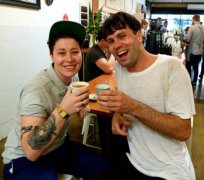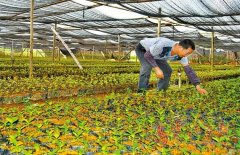Buenos Aires in coffee
After living in Argentina for a long time, many people will inevitably become interested in cafes. When you get up in the morning, sit in an old coffee shop with mottled walls covered with old movie posters, order an Italian latte and turn over a few pages of newspapers, the day really begins.
Buenos Aires, the romantic capital of South America. Like many European cities, there are cafes all over the streets. Some ancient cafes have a history of a hundred years, following the tradition of hand-grinding and brewing, standing like an island in the torrent of time, adhering to the style of the city.
In this immigrant country, Italians and Hispanics are the majority. Two hundred years ago, their ancestors left home with dreams to come to the cloth market, a chaotic, busy, desolate but vibrant place. After a day of fighting for a living, they gathered in the cafe on the street corner to comfort each other and ease their nostalgia.
Kaarina Laguerre, of Hispanic descent, whose parents emigrated at the age of five, followed his father to the Black Cat Cafe on Corentes Street when he was very young. Cold soda, milk foam coffee, golden crisp horns, and her father's smile in the morning light are still her best childhood memories.
Today, Laguerre is 89 years old, and the time-honored house full of memories is still in operation. Every morning, after grooming her eyebrows, painting her lips and dressing her makeup, she would walk into the cafe as if she attended a church service and relive the good old days in a slow drink. She has kept this habit for 30 years.
Argentines do like to go to cafes, even if they are just in a daze. With regard to this deep-rooted cultural habit, Analia Alvarez, Argentina's national treasure coffee tasting expert, explained: "We Argentines do not really like coffee, but more out of a cultural habit inherited from their parents." or an emotional dependence. "
For a long time, cafes have been an important social link in Argentine society, maintaining relationships between people, big or small, close or unfamiliar. "have a cup of coffee together" is the most commonly used social term here. It expresses a kind of kindness to approach actively. A lucrative business opportunity, a marriage you meet for the first time, or a misunderstanding between friends that needs to be resolved can all be hidden under "having a cup of coffee together."
The cafe used to be the center of art and knowledge in Argentina. Tortoni Cafe, tango king Carlos Gadell has sung many times, Einstein used to meet friends here; Lapiella Cafe, Argentine writer Borges often come to read newspapers; British Cafe, Ernesto Sabato completed part of the chapter of Heroes and the Tomb. Today, most of them have become old photos on the wall for people to recall.
Cafes are also witnesses to the history of Argentina. Although many of them have fallen into the dust of the past, their names are always tied to historical events. The Cadalanes Cafe, founded in 1799, was once a meeting place to protest against the Spanish colonial governor and witnessed the May Revolution of 1810. In the 1930s, when Argentina suffered a military dictatorship, the La Helveti Cafe on Mitre Street was a bastion of pen battles for journalists; in the 1950s, the economic boom brought about a rise in song and dance, and cafes worked part-time in small theatres. interspersed with small dramas and tango dramas; in the 1960s, it brought together literati and poets to talk.
At present, there are more than 3000 cafes in the city, including more than 70 time-honored shops over 100 years old. They, or beautifully decorated and modern, such as "Martinez", or the facilities are still like "Tortoni", are all important carriers and lubricants of Argentine social and cultural life. For this tradition on the tip of the tongue, the city government applied to the United Nations Educational, Scientific and Cultural Organization last year to include the local coffee culture on the list of intangible cultural heritage of mankind.
However, with the continuous expansion of "consumer coffee chains" such as Starbucks in recent years, traditional Argentine cafes have encountered a survival crisis. Some famous cafes such as the City of London and Billiards 36 are difficult to maintain and have been replaced by Lido pharmacies and pizza shops. In 1998, the Buru municipal government set up the Committee for the Protection and Promotion of Cafe Excellence, adding 75 old-fashioned cafes to the list of Classic Caf é s. As a result, they have become key recommended cultural tourist attractions, and they can also receive a sum of money for repair and maintenance each year, provided that traditional social images, architectural styles and decorative styles are maintained.
As to whether traditional Argentine cafes can survive in this era of "fast coffee", coffee tasting expert Analia Alvarez said: "I'm not sure about that." To be sure, Argentines can do without coffee, but they can't do without cafes. "
Important Notice :
前街咖啡 FrontStreet Coffee has moved to new addredd:
FrontStreet Coffee Address: 315,Donghua East Road,GuangZhou
Tel:020 38364473
- Prev

Australian men plan to invite 1008 netizens for coffee within 4 years.
According to odditycentral.com, a 28-year-old Australian man, Matt Kulesza plans to invite 1008 Facebook friends for coffee over the next four years. Matt said: I call this plan the 1000 + Coffee Project. I know that in real life, I may not have 1000 friends. I just want to pass this.
- Next

Zhenan, Yunan County, Yunfu County, Guangdong Province expands the scale of coffee bean breeding
After the successful trial of coffee beans in Zhenan Town, Yunan County, it has now entered the stage of expanding the planting scale. The reporter recently learned in Zhenan Town that the Zhenan Katim Coffee Professional Cooperative is vigorously carrying out coffee bean nursery work. At present, a seedling greenhouse covering an area of more than 10 mu has been opened up, and more than 120000 coffee bean seedlings are growing well and can be used for planting more than 400 mu. The reporter is in Weishan of Minqiang Village, Zhenan Town.
Related
- Workers collapse! Lucky suspects that it will introduce freshly cut fruits?!
- 1-point subsidy recipients wear thousand-yuan watches?! Local response: For low-income households
- Can lightly roasted coffee beans be used to extract espresso? How finely should you grind high-quality coffee beans to make Italian latte?
- What is the difference between the world's top rose summer coffee and Yejia Shefi? What are the flavor characteristics of Yega Shefi coffee and Panama rose summer?
- The ceremony is full! Starbucks starts to cut the ribbon at a complimentary coffee station?!
- A whole Michelin meal?! Lucky launches the new "Small Butter Apple Crispy Latte"
- Three tips for adjusting espresso on rainy days! Quickly find the right water temperature, powder, and grinding ratio for espresso!
- How much hot water does it take to brew hanging ear coffee? How does it taste best? Can hot water from the water dispenser be used to make ear drip coffee?
- What grade does Jamaica Blue Mountain No. 1 coffee belong to and how to drink it better? What is the highest grade of Blue Mountain coffee for coffee aristocrats?
- What are the flavor characteristics of the world-famous coffee Blue Mountain No. 1 Golden Mantelin? What are the characteristics of deep-roasted bitter coffee?

